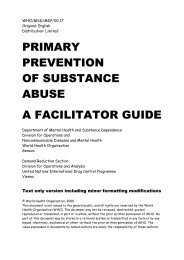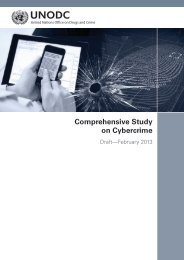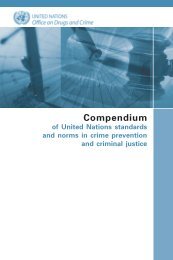Manual for Training Police on Anti Human Trafficking
Manual for Training Police on Anti Human Trafficking
Manual for Training Police on Anti Human Trafficking
Create successful ePaper yourself
Turn your PDF publications into a flip-book with our unique Google optimized e-Paper software.
<str<strong>on</strong>g>Manual</str<strong>on</strong>g> <str<strong>on</strong>g>for</str<strong>on</strong>g> <str<strong>on</strong>g>Training</str<strong>on</strong>g> <str<strong>on</strong>g>Police</str<strong>on</strong>g> <strong>on</strong> <strong>Anti</strong> <strong>Human</strong> <strong>Trafficking</strong> 56<br />
5. You must ensure that the survivor is not made to feel alienated and<br />
threatened. Remember to be a ‘friend’ but never to trespass their<br />
z<strong>on</strong>e of com<str<strong>on</strong>g>for</str<strong>on</strong>g>t as this may result in a breach of trust.<br />
6. You must give due respect to the survivor and your interacti<strong>on</strong>s<br />
(both verbal and n<strong>on</strong>-verbal) with the survivor during rescue as<br />
well as during interrogati<strong>on</strong> must reflect this respect.<br />
7. Avoid patr<strong>on</strong>izing attitude towards the victim.<br />
8. Some other things to remember are:<br />
Ensure that the communicati<strong>on</strong> is as interactive as possible.<br />
Keep the questi<strong>on</strong>s/statements simple and easily<br />
comprehendible.<br />
Use respectful and sensitive language.<br />
An engaging, n<strong>on</strong>-threatening, n<strong>on</strong>-judgmental and<br />
democratic stance helps in keeping the survivor com<str<strong>on</strong>g>for</str<strong>on</strong>g>ted.<br />
While being resp<strong>on</strong>sive, you must not become overly-friendly.<br />
You must ensure that the survivor is not made to feel<br />
uncom<str<strong>on</strong>g>for</str<strong>on</strong>g>table.<br />
Do not become overly-friendly<br />
Listening is a huge virtue in terms of communicati<strong>on</strong>.<br />
Demeaning and degrading gestures and expressi<strong>on</strong>s are very inappropriate and will <strong>on</strong>ly<br />
alienate the survivor. Friendly and open gestures, engaging the survivor in a resp<strong>on</strong>sive<br />
manner will ensure the support and cooperati<strong>on</strong> of survivors as well as instill c<strong>on</strong>fidence in<br />
their minds.<br />
Note to the facilitator<br />
You can share live case studies from the participants to highlight the above points of both good<br />
and bad practices. However, do take care that the participants see themselves not as part of the<br />
problem but as part of the soluti<strong>on</strong>. Also you may want to tell them at this stage that while<br />
dealing with victims trafficked <str<strong>on</strong>g>for</str<strong>on</strong>g> CSE, it is very important to look at our own percepti<strong>on</strong>s and<br />
attitudes that influence our decisi<strong>on</strong>s and acti<strong>on</strong>s. Issues of gender sensitivity are dealt with in<br />
the subsequent secti<strong>on</strong>.<br />
c) Effective listening as a tool <str<strong>on</strong>g>for</str<strong>on</strong>g> communicati<strong>on</strong><br />
Over half of all communicati<strong>on</strong> is listening.<br />
You must be sensitive to the needs of the survivor in relati<strong>on</strong> to their circumstances and aloofness. They<br />
do not want to be c<strong>on</strong>sidered as a victim or another case number by police pers<strong>on</strong>nel, but as a pers<strong>on</strong><br />
instead. There must be a space provided <str<strong>on</strong>g>for</str<strong>on</strong>g> the survivor to be heard and to make sense of their traumatic<br />
experience. It is <strong>on</strong>ly natural <str<strong>on</strong>g>for</str<strong>on</strong>g> the survivor to be threatened and not willing to talk to any<strong>on</strong>e about<br />
their traumatic experiences. Encouraging them to do so must be d<strong>on</strong>e with extreme care and sensitivity.<br />
Listening to their resp<strong>on</strong>ses – both verbal and n<strong>on</strong>-verbal – comprises a crucial part of this communicati<strong>on</strong>.<br />
It will be <strong>on</strong>ly normal <str<strong>on</strong>g>for</str<strong>on</strong>g> the survivor to take some time to break the ice and feel willing to cooperate<br />
with the police pers<strong>on</strong>s. Understanding this need and letting the survivor take some time is essential.<br />
However, it must also be noted that if the survivor is unwilling to cooperate at any stage, s/he may not<br />
resp<strong>on</strong>d despite the best ef<str<strong>on</strong>g>for</str<strong>on</strong>g>ts put <str<strong>on</strong>g>for</str<strong>on</strong>g>th by the police pers<strong>on</strong>nel. It is thus your own judgment as an<br />
investigating officer to appreciate the survivor’s level of resp<strong>on</strong>siveness.<br />
You may want to do the following activity with your participants.<br />
Engaging, n<strong>on</strong>-threatening stance

















